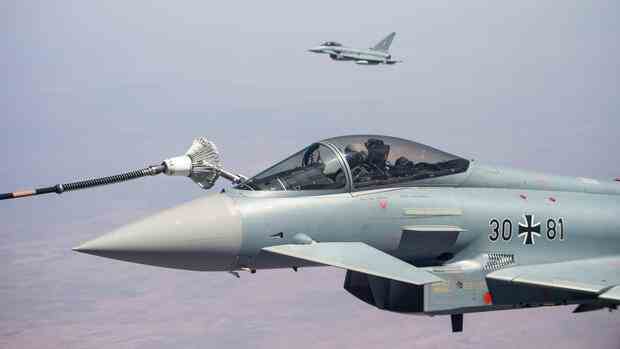Stockholm The world’s 100 largest defense companies sold almost $600 billion worth of heavy weapons and military services in the year leading up to the Ukraine war. Despite pandemic-related disruptions in supply chains with delays and bottlenecks, global arms sales rose by a currency-adjusted 1.9 percent to $592 billion in 2021, the Stockholm-based peace research institute Sipri said in a report published on Monday. The renewed increase was higher than in the previous year, but was below the average increase of the four years before Corona.
“We would have expected even greater growth in arms sales for 2021 without the ongoing supply chain problems,” summed up Sipri expert Lucie Béraud-Sudreau. Larger and smaller companies alike reported disruptions during the year, and some, like aircraft manufacturer Airbus, also reported labor shortages.
According to the report, global arms sales have been increasing steadily since at least 2015 – the year Sipri was able to include Chinese companies in its annual list for the first time.
>> Read here: Dassault and Airbus agree on the next project phase for the fighter jet of the future
Top jobs of the day
Find the best jobs now and
be notified by email.
Between 2015 and 2021, the sales figures of the 100 largest armaments companies increased by a total of 19 percent, adjusted for currency effects. The value for 2021 is the highest that the peace researchers have recorded since the database was set up around 20 years ago. Sipri includes all sales of heavy weapons and military services to military customers at home and abroad.
After growth of 1.1 percent in the first Corona year 2020, the sales figures increased again somewhat more strongly. Bucking the trend, US companies experienced a slight decline of 0.9 percent to $299 billion, which Sipri attributed to high inflation in the United States last year.
The 40 listed US companies – including the top five – now together account for 51 percent of all sales among the top 100 corporations. China follows in second place with a share that has risen sharply to 18 percent, followed at some distance by Great Britain (6.8 percent) and France (4.9 percent). Germany has a share of 1.6 percent.
Arms sales have exploded as a result of the Ukraine war.
(Photo: dpa)
With a minimal increase of 0.4 percent, Russia had a share of 3.0 percent before invading Ukraine. While reports indicated that Russian defense companies are ramping up arms production in response to the Ukraine war, they have had trouble getting hold of semiconductors, Sipri wrote. They are also affected by war-related sanctions.
War in Ukraine continues to challenge supply chains
Exactly how the Ukraine war will affect the global numbers is unlikely to be seen until next year. But the peace researchers already wrote: “Russia’s invasion of Ukraine in February 2022 has increased supply chain challenges for defense companies, not least because Russia is a major supplier of raw materials for weapons production.” According to the report, these include aluminum, copper, steel and Titanium.
Ultimately, this could also complicate efforts in the US and Europe to strengthen the military and replenish stockpiles after sending billions worth of ammunition and other equipment to Ukraine. “If supply chain disruptions continue, it could take several years for some of the largest arms producers to meet the new demand created by the Ukraine war,” said Sipri researcher Diego Lopes da Silva.
In Europe, Sipri sees two trends: While sales in military aviation fell, they rose in shipbuilding. European armaments sales increased by 4.2 percent compared to the previous year to $123 billion, while those of the four listed German companies Rheinmetall, ThyssenKrupp, Hensoldt and Diehl increased by 5.6 percent to $9.3 billion. Airbus, number 15 in the ranking after a 15 percent drop in arms sales, is considered by Sipri to be a trans-European group.
Greenpeace assumes that sales of armaments will literally explode in the course of the Ukraine war. Greenpeace security expert Alexander Lurz warned that countries would then lack this money for social issues, climate protection and education. Germany in particular needs initiatives for international arms limitations. “The armaments companies earn a lot from the fact that states are increasingly relying on military strength,” explained Lurz. “The risk of further conflicts and wars increases, because the rearmament of one is a threat to the other.”
More: Poland’s finance minister: “We’re not waiting for the money from Brussels”
